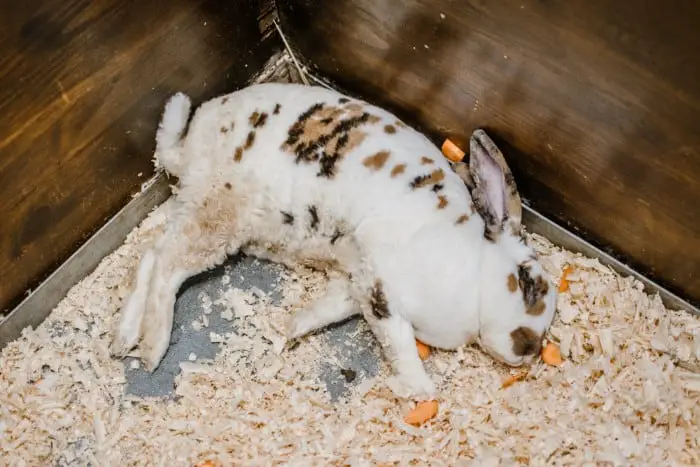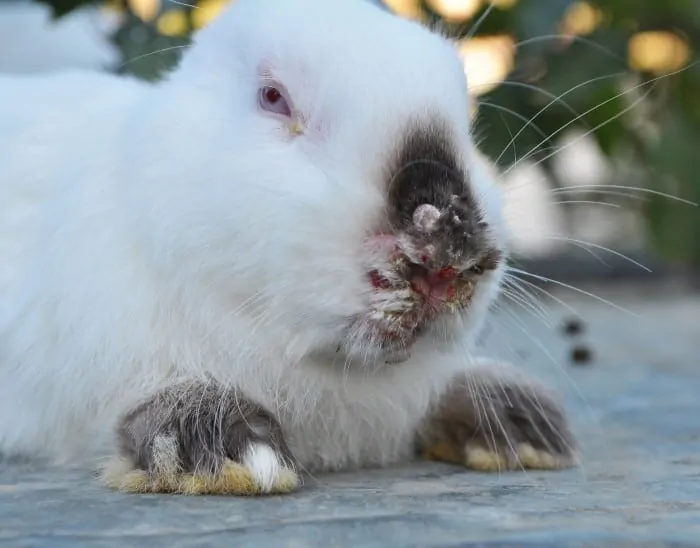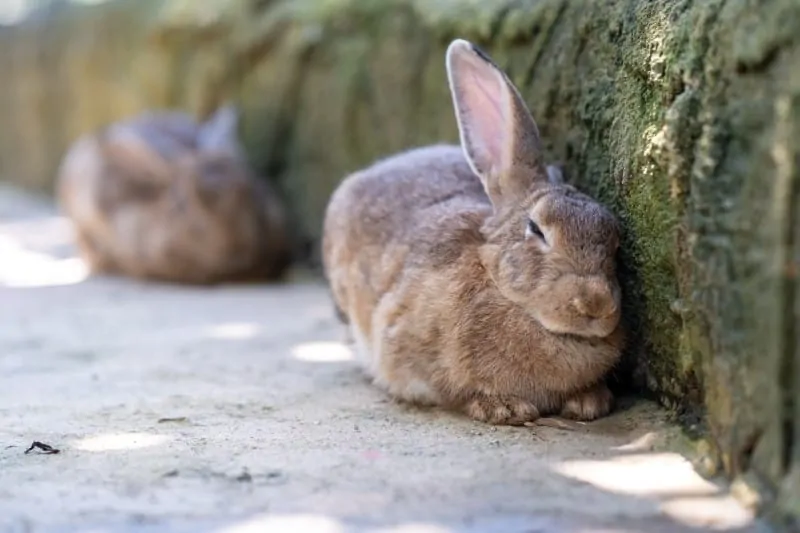All of those who have ever owned pets and are animal lovers know too well how painful it can be to say goodbye to our dearest friends. The death of a pet is a harrowing experience.
Although this is a topic we would not want to discuss, we must do so. While we know that death is part of all animals’ life cycles, losing our rabbit will always be a heartbreaking experience.
It would be best if you get ready to assimilate this moment. For this reason, we will now show you some signs that your rabbit is dying.
What Can Cause the Death of a Rabbit?
Rabbits can die for various reasons: a natural consequence of the aging process, due to health or medical conditions, or by accident. It is essential to know that the life expectancy of rabbits varies depending on the breed and the care and environment offered by their owners.
As a rule, a wild rabbit can reach between 3 and 4 years of life, while a well-cared for domestic bunny can live between 6 and 12 years.
We all know that the older our pet rabbit gets, the more anxiety we will begin to feel at the mere idea that such a terrible time is approaching, especially if our rabbit has already started to show signs of illness.
Signs That Your Rabbit Is Dying
Although some bunnies can undergo a sudden death, some symptoms indicate that a rabbit will die. If your rabbit is already old, the best thing you can do is to be by its side and provide it with a comfortable and positive environment at the time of its death.
But if your rabbit is still young and healthy and develops any of these symptoms, you should seek immediate help from a specialized vet.
Next, we will describe some of the most frequent signs that a rabbit is going to die:
Your Bunny Refuses to Eat or Drink
This is one of the signs which raises a red flag. If you notice that your rabbit does not want to eat or drink water, you should be alert. Rabbits need adequate food and sufficient caloric intake to maintain optimal development; this is more critical in the developmental stage. Even though an adult rabbit may not consume as much food as a juvenile rabbit, a lack of food or water intake can be a sign of some illness or that its end time is approaching. Nevertheless, you must never force your bunny to eat or drink.
Signs That Your Rabbit Is in Pain
A sick or fragile rabbit can show signs of pain and discomfort. Usually, rabbits are tranquil animals. We can notice that a rabbit is suffering from pain because its behavior tends to change, and they begin to emit screams or moaning sounds. Some rabbits can even get to grind their teeth.
Inactivity
Healthy rabbits are usually very active and playful. For this reason, if you notice that your rabbit spends more time inactive or if it remains lethargic, it might be a sign that something terrible is happening. When feeling weak, rabbits tend to stay still, in a lethargy state or apathy and have many difficulties getting up and moving.

Lack of Cleanliness
Rabbits tend to be very obsessive about their cleanliness. They spend a large part of the day grooming themselves. If you notice any changes in this behavior or see that their fur is not as well cared for as it used to be, this could be a sign of some critical illness. Sick rabbits tend to lose interest in grooming.
Alteration of Vital Signs
One of the most significant changes to consider when a rabbit is going to die is its vital signs. When a rabbit is about to die, its vital signs will be affected:
- Respiration: The average breathing rate of a rabbit is between 30 and 60 breaths/minute. When your rabbit is dying, you will see that its breathing pattern will become more agitated, and it will experience shortness of breath.
- Heart rate: The average heart rate of a rabbit is between 180 and 250 beats/minute. A dying rabbit will have a slower heart rate. Its pulse will begin to slow down gradually until it becomes exhausted.
- Body temperature: The average temperature should be between 100ºF (37.7ºC) and 104ºF (40ºC). A temperature lower or higher than usual indicates that something is wrong. A dying rabbit usually tends to have a low temperature.
- Capillary refill time: Normal capillary refill time is 2 seconds or less. A capillary refill that takes more than two seconds to recover is an alarm signal.
It is essential to know these parameters and learn how to measure them so that you can monitor your rabbit at home before going to your vet. You can ask your vet to show you how to take your pet’s vital signs. It is easy enough, and you will only need to have a timer and a thermometer to assist you.
Breathing Difficulties
A healthy rabbit has calm breathing and generally does not make any sounds. If you notice that their breathing becomes difficult and they begin to gasp for air or emit a wheezing sound, shortness of breath, sneezing, or flared nostrils, do not hesitate to take them to your vet.
Excessive Drooling
A rabbit that is about to die begins to drool more than usual. Sometimes it can soak all its fur or its blanket.
Unusual Behavior
The state of vulnerability that dying bunny experiences can produce behavioral alterations in the rabbits. They can turn more aggressive, nervous, or fearful than usual. You are the only one that will be able to differentiate when a behavior is habitual or not. That is why it is essential to spend time with your rabbit and learn to know it.
Tremors and Shivering
Tremors can occur in a dying bunny, and usually, its jaw will become more rigid. Shivering is a bad sign. It means your rabbit might be getting cold, entering a state of shock, or a combination of the two. The best thing you can do is place a light blanket over their bodies to provide some heat and comfort.

Involuntary Jerks
This phase can be somewhat traumatic to observe because they can inadvertently bump themselves very hard against any surface. If you want to help your rabbit, just let it rest on a cushioned surface and roll several pillows around to prevent further damage. Sometimes involuntary jerks are often followed by violent spasms. When they start to jerk, squeak, and move very fast. It is hard and sad to say, but your rabbit will not live much longer after this phase.
Involuntary Release of its Sphincters
Sometimes, a sick rabbit can develop diarrhea. You should be aware of any change in its feces or urine. Like diarrhea, a lack of defecation can also be a sign of occlusion, usually fatal if not treated on time. It is crucial to observe the color of the feces and urine and distinguish if blood is present. If you notice any changes in your stools or urine, it is necessary to consult your vet. You may be in time to prevent something worse from happening. A rabbit about to die can involuntarily release its sphincters; this is because it loses control over them.
What Can You Do if Your Rabbit Shows Signs of Dying?
Sometimes our pets may become suddenly ill. In the case of any symptoms, it is essential to consult your vet immediately. Perhaps a consultation in time could save its life.
On other occasions, death occurs as a consequence of the natural process of aging. We know that this can be a complicated situation to face. Still, the most important thing is that you can accompany your rabbit at the moment of its death to transmit tranquility, comfort, and affection. Showing your love and respect is the least you can do to thank your pet for all the love it has given you throughout its life.
Indeed, seeing your rabbit die will have a significant impact on you and your family, but you will need to remain calm to say goodbye to your companion and offer your love during its last moments. Here is what you can do:
- Try to remain calm and stay by its side.
- The experience of dying can be just as traumatic for you as for your bunny. Try to pet your bunny to make it feel calmer but avoid excessive manipulation.
- Avoid making loud noises. If necessary, take to a quieter room where there is not much human or animal traffic.
- Avoid any sudden moves. The least we can do is to provoke more stress in your pet’s last moments of life.
- Just stay with your bunny and act as gently as you can.
If you do not feel ready to experience this transition, don’t be embarrassed to ask a family member or friend for help.
How Do I Know if My Rabbit Has Died?
To confirm that your rabbit is dead, you must check for the absence of vital signs and its behavior and identify the following:
- The rabbit does not breathe and does not move at all.
- Pulse is absent.
- There is a release of its sphincters.
- Your bunny shows no response in the time of capillary filling.
- Your bunny’s body will become rigid.
A healthy and well cared for rabbit can last up to 12 years, depending on its breed. However, if it suffers from any of the rabbits’ common illnesses, there is a chance that your pet rabbit could die suddenly. For this reason, to enjoy the company of our rabbits for longer, we need to provide them with essential care, paying particular attention to complete and balanced nutrition, physical and mental stimulation, preventive medicine, and of course, your love and company.

